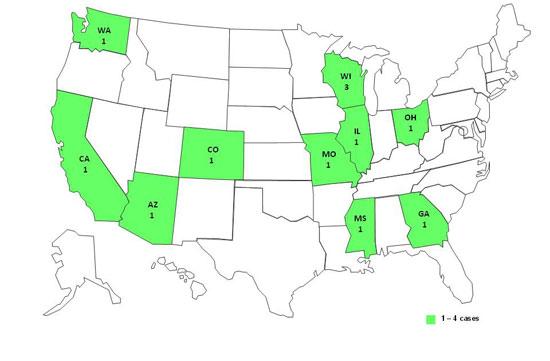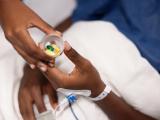Apr 5, 2011 (CIDRAP News) – Laboratory investigation of the Salmonella Hadar strain linked to a ground turkey burger recall and 12 illnesses reveals that it is resistant to several antibiotics, the US Centers for Disease Control and Prevention (CDC) said yesterday.
In addition, two samples of Jennie-O ground turkey burgers collected from the homes of sick patients in Colorado and Wisconsin tested positive for the outbreak strain, the CDC said.
On Apr 1 the US Department of Agriculture announced that Jennie-O, based in Willmar, Minn., recalled 54,960 pounds of frozen raw turkey burgers that were packaged on Nov 23, 2010, and distributed to retail chains nationally. The first clue that the turkey burgers could be contaminated came when Wisconsin officials notified federal officials about a patient who had been sickened by Salmonella enterica serotype Hadar.
So far 12 people from 10 states have been identified with similar infections. States have reported that the outbreak strain is resistant to several clinically useful antibiotics, including ampicillin, amoxicillin/clavulanate, cephalothin, and tetracycline, the CDC said. Drug-resistant Salmonella infections can increase the risk of hospitalization or lead to treatment failure in sick patients, it added.
The CDC said the illnesses were detected between Dec 27, 2010, and Mar 24. Three of the 12 patients were hospitalized, and no deaths have been reported. Case-patients range in age from 1 to 86 years old, with a median age of 29. Sixty-three percent of them are female.
Federal officials have warned that as the investigation progresses, more raw turkey products could be recalled. They advised consumers to take extra precautions when cooking and serving poultry.
The CDC has said in past notifiable disease updates that rates of antibiotic resistance among several Salmonella serotypes is increasing, with a substantial number of Typhimurium and Newport isolates that are resistant to multiple drugs.
For example, a December 2007 outbreak of multidrug-resistant Salmonella Newport linked to ground beef sickened at least 38 people in four states, according to previous reports. In 2006 and 2007, multidrug-resistant Salmonella Newport was linked to about 85 infections in patients who ate unpasteurized Mexican-style aged cheese, according to a 2008 issue of Morbidity and Mortality Weekly Report (MMWR).
In June 2010 the US Food and Drug Administration (FDA) issued draft guidelines to reduce the nontherapeutic use of antibiotics in food-producing animals. Many public health experts suggest that high-volume use of antibiotics at farms has led to the development of resistant strains that pose a risk to humans.
Dr Martin Wiedmann, associate professor in the Department of Food Science at Cornell University whose specialty areas are Listeria monocytogenes and Salmonella, said the involvement of a multidrug-resistant Salmonella strain in a foodborne illness outbreak isn't unusual. "Salmonella Hadar is a less common serotype, but overall it's not too surprising," he said, adding that there are a considerable number of Salmonella subtypes that are resistant to commonly prescribed antibiotics.
He said the food safety reminders for consumers, though they may seem routine in any outbreak, are especially important, given that the public might not be as concerned about ground turkey as they are about ground beef. "All types of ground meat have the potential to have some of these pathogens, so it's critical that there is appropriate handling in consumers' homes," Wiedmann said.
Another message the outbreak sends is the need to strengthen the public health infrastructure so that state labs can routinely test for drug-resistant strains, which can be costly, he said.
"Multidrug-resistant strains are out there, and we know they continue to cause outbreaks. A concern is if we don't have the lab capacity to detect them, patients won't get the treatment that they need," Wiedmann said.
Map and epi curve courtesy of CDC.
See also:
Apr 4 CDC statement
Dec 21, 2007, CIDRAP News story "Drug-resistant Salmonella outbreak linked to ground beef"
Apr 25, 2008, MMWR report
Jun 28, 2010, CIDRAP News story "FDA draft proposal looks to limit farm antibiotics"





















